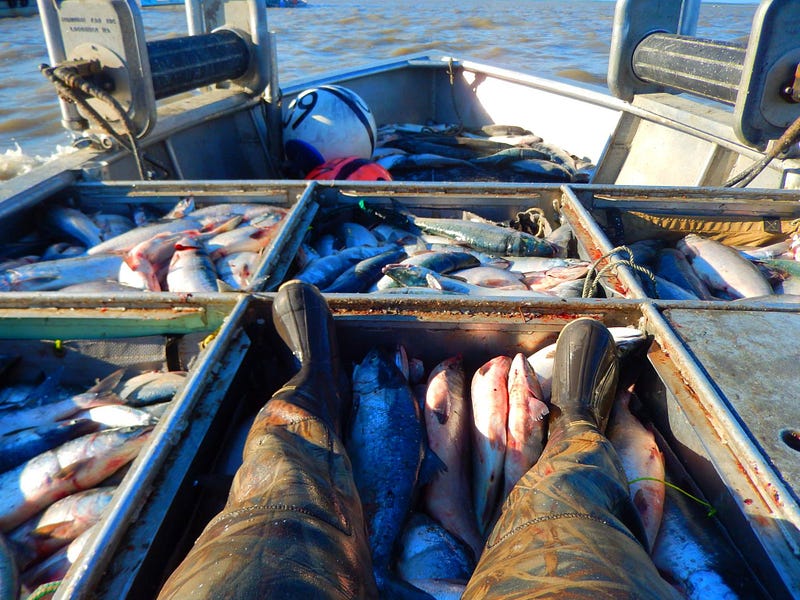Hungry and Hooked
At just 16, I was fishing for salmon in the unforgiving Alaskan waters with my dad and a crew of three
By Mia Steben

Angry waves crashed into the 22-foot skiff with relentless power, pouring water into the boat. The 115 Yamaha outboard motor was sputtering, making little difference in the churning water. Torrents of rain and gusts of wind made it almost impossible to see against the dark landscape of the ocean. I was furiously bailing water with a half-sliced oil container, clenching my chattering teeth. I wiped the rain from my eyes and looked at our boat crew of three. Peter, a military veteran, Kevin, a kid from Minneapolis and my dad, the captain.
“I can’t get the radio working,” my dad yelled from the helm, which consisted of a steering wheel, several duct-taped wires and emergency equipment for boat malfunctions.
All the boats had gone back to shore because of the weather.
We were stuck in one of the worst storms of the season with 5,000 pounds of sockeye salmon stowed away in built-in bins between the bow and stern.
“We need to find Donny. I need to go further from shore. Get rid of some fish,” shouted my dad, muffled by the wind and cut off by a wave crashing onto his face. Donny was our fish buyer.
Gripping the wheel and driving the motor at maximum speed, I saw my dad maneuvering us through the irritated ocean swells, making slow progress. The crew and I worked together, dumping water and throwing some of our salmon back into the sea to lighten our load. I didn’t know if we were going to sink. I was scared. We were covered in fish blood, guts and scales. At 2:00 a.m., we were mentally exhausted and drenched with a combination of slime and rain.
Peter, first mate, jumped to the back of the skiff and exchanged a few words with my dad. Communication was key. Bristol Bay during a storm was not a place to make simple mistakes.
“I’ll check the radio again. Is no one on channel 80?” yelled Peter. I watched his military training overcome any uneasiness as he made decisive movements and jumped over bins. Quick, sharp and alert despite having been on the water for 35 hours.
Kevin, or “Greenie” as I liked calling our first-year deckhands, was unsettled. He was tough for his age but not used to this.
He was bailing with our only bucket, peering into the darkness and continuously wiping the rain from his eyes, masking his nerves.
After five years of commercial fishing in Alaska, I knew the returners from those who never wanted to come back. People either hungered for more or left the industry behind them.
“There, there, on the starboard side!” Kevin pointed out a distant shape, almost unrecognizable, bouncing in the waves.
Fighting against the elements, we approached and yelled, stomping our feet against the aluminum bottom of our boat, trying to get Donny’s attention. Our attempts were drowned out by the howling winds and crashing waves against our battered skiff. Donny’s duty as tender captain is to unload catches regardless of the hour. That night, he was one of few tenders who stayed to brave the storm.
No lights. He must be catching a few minutes of precious sleep.
“Get up, Donny, we got fish,” I yelled with exhausted determination.
Just getting aligned and properly tied with Donny’s tender took an unusually long time. Carefully jumping between boats, I refused to look down at the rushing current. I never looked. One wrong move was deadly. My dad met someone who lost both legs being crushed between two boats delivering fish.
“Didn’t expect to see you,” said Donny in a sleepy voice, as he gestured for my commercial fishing permit card inside his little cabin. He placed my permit card in the imprint machine to account for the load of salmon. Each time Donny handed back the fish ticket, we made money.
“I wasn’t about to let this fishing opening just pass us. When I see an opportunity, I go for it,” I said shoving my stiff fingers back into soaked gloves.
Donny laughed. He understood.
Commercial fishing was addictive, and I was hungry for more.